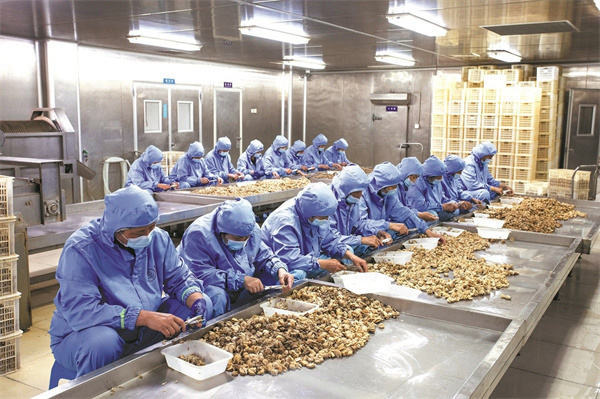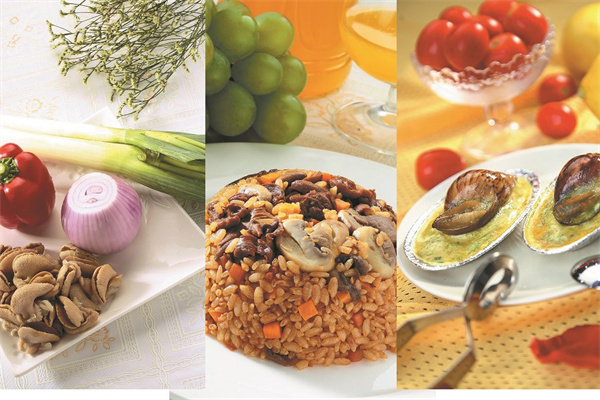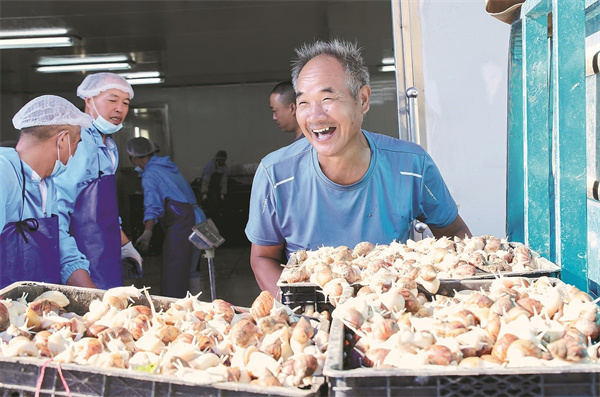Snails bring wealth of benefits to villagers

Farmers at Jiaxing Qianfu Food Co, a rural cooperative based in Daqiao town, Jiaxing, Zhejiang province, prepare snails as ingredients for dishes. CHINA DAILY
Breeding industry plays positive part in rural vitalization
Xu Qinsen and his wife used an iron spade to place lime into piles of soil in their yard, each end of which is enclosed by wooden frames.
"We do this to give our snails enough calcium to grow," said Xu, who comes from Zhejiang province.
In the two snail breeding rooms at Xu's yard in Puguang village, Yuxin town, Jiaxing city, rows of wooden boxes are neatly placed in the shade. The rooms are kept at a constant temperature.
More than 100 white jade snails, the meat of which is similar in appearance to the precious stone, can be seen as Xu removes the lid of one box.
"For the past 15 years, these little creatures have changed my life," said Xu, who before 2008 did a range of part-time handiwork jobs, earning barely enough to support his family.
Then, he discovered that many locals were breeding snails, and made inquiries to obtain further details.
Xu discovered that Jiaxing Qianfu Food Co, a rural cooperative based in Daqiao town, about a 20-minute drive from his home, was offering snail breeding training and purchase deals.
The growth cycle of snails is four to five months, and there are about three rounds of breeding per year.
The market price for snails is 20 yuan ($2.79) per kilogram, and the company buys 15,000 kg of Xu's snails annually, which provides him and his family with an income of 250,000-300,000 yuan.
"This is several times as much as I earned from my part-time jobs," he said.
After Xu submitted an application to the company, he received free training for a year. As he became more familiar with his new work, he increased the breeding of snails at home, enabling the family to move into a new villa and buy cars.
The Xu family is among more than 500 rural households to prosper from the booming snail industry in Jiaxing, which Huang Yongxiao, Party secretary of Daqiao, said accounts for 70 percent of the nation's edible snail production.
These households are located not only in Zhejiang, but also in Anhui, Hebei, Jiangxi and Henan provinces.
Each household can increase its annual income by an average of 100,000 to 300,000 yuan, local authorities said.
"This is a big improvement compared with before, when rice cultivation was the main source of local income," Huang said.

From left: Snails with other ingredients for a dish; snails fried with rice; baked snails. CHINA DAILY
Turning point
Although farmers in Jiaxing started to breed snails back in 1987, market demand was small and unsteady, with only a few restaurants placing orders. As a result, the industry grew at snail's pace.
"The overall income of rural households in those days was not high," Huang said.
The turning point came when Shen Fuliang, a farmer in Daqiao, was considering selling snails online in 1999, after being inspired by technology giant Alibaba, which had just been founded in Hangzhou, capital of Zhejiang.
Despite facing a huge initial investment and skepticism from friends and family, Shen decided to put his idea to the test.
"I thought it was better to try and fail, rather than envy others' success," he said.
After several attempts, Shen launched a website to sell snails in May 2000. However, just when his hopes were falling after two months without any business, the first order arrived, giving him the confidence to persist in his new venture.
"I had faith that as more people became acquainted with the internet, this would open up new opportunities online," he said.
Just a year later, Shen was inundated with orders for snails from across the country.
Seeing his success, local snail farmers also launched online businesses to meet the surging demand.
In 2000, Shen founded the snail breeding cooperative with local government support, but the expanding market soon brought new problems.
Long-distance transportation to cities such as Beijing and Guangzhou, capital of Guangdong province, led to a significant loss of live snails, despite the adoption of protective measures such as using ice cubes in summer and foam boxes for insulation in winter.
To address the issue, Shen considered removing the snails' shells and internal organs to produce semifinished products for cold storage, an ambition he finally realized in 2003.
"This way, the shelf life of snails is extended from just a few days to 18 months, significantly prolonging the sales cycle and reducing transportation costs," he said.
In 2005, Jiaxing Qianfu Food Co took part in drawing up provincial snail breeding standards, which have resulted in rigorous supervision and consistent production levels.
The company now operates a snail industry chain, which features a breeding demonstration farm, a laboratory for quality checks, and washing, shelling and cooking facilities.
Humid conditions
Visitors to the company's snail breeding farm are greeted by a blast of humid air.
Chen Zepeng, Shen's son, who helps run the snail business, said, "The temperature has to be maintained at about 28 C and the humidity level at above 80 percent."
Some 120-150 snails are kept in a single breeding box with a layer of soil at the base. There are hundreds of such boxes at the farm.
"Each box is cleaned every seven to 10 days and the soil is replaced, because the snails will stop feeding if their living conditions are dirty," Chen said.
Pulverized lime is sprinkled as a calcium supplement over the fresh soil in the breeding boxes, before fresh vegetables and other food is put in.
"The final step is to spray the boxes with water to increase the humidity and enhance the smell of the snails' food," Chen said.
After growing for four to five months, white jade snails will weigh 35-40 grams, and are ready for use.
Snails from the demonstration farm and rural households are then randomly selected and sent to the laboratory to test for substances such as antibiotics.
Next, the snails are placed in an automated washer before going to the shelling room, where a dozen employees wearing laboratory coats, hairnets, gloves and face masks adeptly perform this procedure.
"We have to shell the snails by hand, as every shell has an irregular shape," Chen said, adding that automatic arms were used as an experiment for this procedure, but they often broke the shells, leaving shards in the meat.
The meat then undergoes a second round of fine-trimming to ensure it is thoroughly cleaned.
"These manual steps require more than 50 villagers, who have been with us for a long time and are highly proficient in their work, which gives them extra income," Chen said. The workers handle 50,000 kg of snails a day.
The snail meat finally goes to a central kitchen, where it is cut into different shapes and sizes as required by customers, and prepared into premade dishes with various ingredients.
At the central kitchen, Feng Limin, director of the company's precision processing workshop, said, "Our products have evolved from simple semifinished goods to gradually include eight premade dishes."
Before joining the company in 2006, Feng worked as a restaurant chef.
"I'm glad I made the right decision," he said, adding that he has seen firsthand over the years how snail breeding and processing standards have continued to improve.
"Everyone at the company believes that happiness doesn't come to them on its own--it's achieved through hard work and perseverance," Feng added.

A local farmer sells snails to Jiaxing Qianfu Food Co. The company offers snail breeding training and purchase deals. CHINA DAILY
Deals secured
The company has secured deals to supply a wide range of Western-style restaurants in China, including Domino's Pizza, Saizeriya and Pizza Hut.
"These outlets used to account for nearly 100 percent of our supplies," Chen said.
But as local customers have developed increasingly diverse palates, Chen said an increasing number of Chinese restaurants have added snails to their menus in recent years.
He said snail meat, which is high in protein and low in fat, caters to the rising demand among Chinese customers for healthy and nutritious food.
During weekends, Jiaxing Qianfu Food Co often welcomes a large number of families and study tour guests.
At the company, children not only learn about the life of a snail, but also experience the difficulties that snail farmers face.
"We want to create a natural classroom for the children to learn about agriculture," Chen said.
The demand for local snails has resulted in more visitors arriving at the company to seek business opportunities.
In Jinzhu town, Lishui city, Zhejiang, about a four-hour drive from Jiaxing, white jade snails have also become a major source of income for villagers, thanks to support from the company and local authorities.
Huang, the Daqiao Party secretary, said: "After 30 years of development, the snail industry is playing a positive role in rural vitalization. A complete industry chain consisting of snail breeding, training, tourism, acquisition, research and development, processing, and sales has been established in the area."
Booming development of the snail industry has also helped make full use of the rural labor force.
"Villagers prefer flexible employment. As they like to work in the fields during busy agricultural seasons, and in the factory during idle periods, the cooperative offers full-time and part-time work to promote overall employment in the area," Huang said.
In particular, Jiaxing Qianfu Food Co gives priority to people facing difficulties in finding work and also to those on low incomes, he added.
The company has more than 60 full-time employees with an average tenure of over seven years, and Huang said its flexible employment strategy has attracted some 650 local workers.
Chen, who is in his 20s and has worked in the snail industry for a few years, has a plan for the future.
"We can branch out into other industries that use snails, such as cosmetics," he said.
Chen has noticed that some international companies claim to have used snail slime to make skincare products.
"Given the sheer volume of the snails we process, there must be great prospects in this field, once we overcome technical problems in snail slime extraction, filtering and preservation," he said.
yangfeiyue@chinadaily.com.cn





 play
play